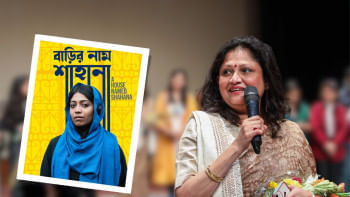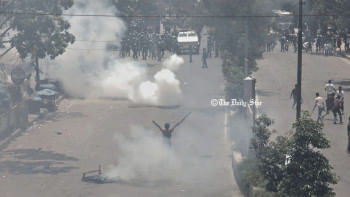Dr Israfeel Shaheen: A professor’s quest to promote unconventional theatre

Theatre is not only a transformative art form, but can be the boldest mirror of any society.
Dr Israfeel Shaheen, a noted theatre director and professor at the Department of Theatre and Performance Studies, University of Dhaka, has many achievements in his bag as a prominent theatre personality who is taking Bangladesh's folk, indigenous, and improvisational theatrics to the world's stage. However, besides his commendable accomplishments, he always traces back to his roots and brings forth what we, as Bengalis have to offer centered on our rich cultural genesis and resourcefulness.

The cultural personality, who is currently in Thrissur, Kerala, India, for the International Theatre Festival with his students to perform and join panel discussions, lectures and workshops, talks to The Daily Star about his take on the theatre scene of Bangladesh and aspirations.
"Theatre is indeed a transformative, immersive and perhaps the most consolidated form of art, and I have nothing against the traditional set-ups, foreign adaptation or influence in Bengali theatre or our inclination towards it," said Dr Israfeel while expressing his views on traditional theatre.

"However, I do not think that we need to go above and beyond to meet the expectations of world theatre, as I believe we have more rich theatrical elements embedded in our culture. Didn't we all grew up creating improvisational scenarios in childhood and performing certain characters while playing 'Putul Khela', 'Bou Chee', and 'Jemon Khusi Temon Sajo'. Did we know about any acting frameworks then? Then, why do we need to depend on Western theatre, not that it is a bad thing. What I am trying to say is we need a healthy, rational integration of all our assets," the professor said while tracing back his earliest inspiration in theatre.

"I was born and brought up in Panchagarh, and while growing up, I have been able to experience a varied range of our regional performing art forms, such as 'Jatra Pala', 'Palatia', 'Dhamer Gaan' and many more indigenous theatre forms and this became my inspiration to do something on the field of folk, indigenous theatre," said Dr Israfeel, a political science graduate, who devoted his life to theatre later on in his career, stressing his humble beginning in theatre.

"We have a misconception that Street Theatre erupted during the 1990's Mass Uprising in Bangladesh against the Ershad regime, but it's not true. If we trace back, we will see that art form has always been one of our greatest treasures. So, when I went to India's prestigious National School of Drama, I chose "Street Theatre" to be my core study. See, theatre can never be limited to the somewhat 'privileged' people, who can pay to watch a performance," the theatre activist explained.

"From my earliest days, I have travelled to the distinct places of Bangladesh with Mamunur Rashid's 'Aranyak Natyadal', and there we used to listen to the marginalised people, a tale of their hardship, happiness and aspirations, and then we used to create improvisational scripts on which they used to perform. We have theatrical elements all around us, and if we do not promote our own people, who will?" asked Dr Israfeel.
"I advocate for the theatre for the oppressed, it's a massive undertaking, you see. Even now, we are not showcasing, promoting or telling truths of our origin, the rich culture that we are made of. Art is not for art's sake, it's for people's sake–is what my belief stands at and I am working to fulfil that dream of mine," explained the theatre personality.

"I come from a middle class family, and when I go to classes, I can feel the angst of my students who are coming from this background. I never try to push any texts, ideas, frameworks to my students, rather, I prepare them, fostering their own merits and outlook. That is the single reason that I did not form my own theatre troupe, because I didn't want to limit myself, my work and performers to a corner. I have taught for almost over 25 years at Dhaka University, private and foreign universities and now I have 100s of students, true performers who inspire and empower others," the professor said, while explaining his insights on the practices of theatre.

"With my students, I go to prisons, juvenile correctional centres, villages, and indigenous regions to enable them to tell their stories by themselves. Theatre is not limited to mere spectacles or an entertainment medium, it can be transformative and a great source of healing and empowerment. Be it a convicted person, be it a farmer, be it a minority, oppressed people, we have to take steps that ensure healing and reformation, other than that we will be limiting ourselves", Dr Israfeel said, while denoting his philosophical stand.

"I am a sixty-year-old teacher and theatre enthusiast, who wants to take theatre to the doorsteps of people who are meant to perform, transform and enjoy it. I aspire to reestablish our old practices of theatre," concludes the theatre practitioner.

 For all latest news, follow The Daily Star's Google News channel.
For all latest news, follow The Daily Star's Google News channel. 




Comments